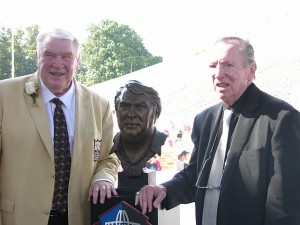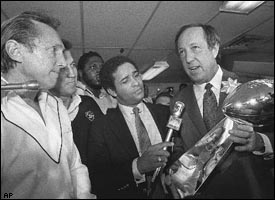NFL Loses a Legend With Death of Oakland Raiders Boss Al Davis
For all the jokes that have been made about the Oakland Raiders in recent years, there has always been a special aura around the “silver and black”. The reason for that was the man who built the Raiders practically from scratch, Al Davis. His death at the age of 82 is a huge loss not just for the Raiders, but for all of professional football.
Few could have predicted when the 33-year-old Davis became the youngest person in the history of professional football to hold the position of head coach and general manager at the same time that Davis would turn the Raiders into one of the iconic sports franchises in America.
Though he showed glimpses of brilliance immediately as the Raiders went 10-4 and Davis was named AFL Coach of the Year during his first season as head coach. He spent two more seasons as head coach and compiled an overall record of 23-16-3.
In April of 1966 Davis was named commissioner of the AFL, but his tenure would prove to be very short. While Davis was working to make the AFL stronger and more formidable in their competition with the NFL, other owners (without his knowledge) were working on an agreement to merge with the NFL. Davis ultimately opposed the merger because he felt the NFL was receiving excessive compensation from the AFL teams, but the merger still went through.
He ultimately resigned as commissioner and returned to the Raiders where he bought a 10 percent share of the team and became one of three general partners. He also served as head of football operations as the Raiders played in Super Bowl II and continued to build a squad that would be among the best in football during the 1970s.
In 1972 he took control of the Raiders as managing general partner and served in that role until his death.
Between 1967 and 1985, the Raiders joined the Dallas Cowboys and the Miami Dolphins as the most consistent franchises in the NFL. During that stretch, the Raiders won three Super Bowls, one AFL championship, 13 division titles and appeared in the playoffs 15 times.
A total of 20 former Raiders (including 13 that spent a majority of their career with the Raiders) are inducted in the Pro Football Hall of Fame. That is the most among any AFL franchise and significantly more than a number of franchises that have been around much longer than the Raiders.
Davis was well known for his contentious relationship with NFL Commissioner Pete Rozelle. He sued the NFL on multiple occasions over the years, primarily related to the ability for him to locate or re-locate his team in different cities.
In 1982 he moved the Raiders from Oakland to Los Angeles and they stayed there until 1995. During their time in Los Angeles, the Raiders became popular with the growing hip-hop culture. In 2010 the ESPN 30-for-30 series featured “Straight Outta L.A.” which was directed by Ice Cube and chronicled the significance of the Raiders within the hip-hop movement.
Over the last 20 years, Davis remained in control of the Raiders both on and off the field, but the team eventually started to lose their luster.
Since moving back to Oakland in 1995, the Raiders have made the playoffs only three times with those trips coming in consecutive years from 2000-2002. Following the 2001 season Davis had a public fued with head coach Jon Gruden and eventually traded him to the Tampa Bay Buccaneers.
The next season the Raiders and Buccaneers both reached the Super Bowl with Tampa Bay dominating the game 48-21. Oakland has not made the playoffs since and their 8-8 record in 2010 was their first non-losing campaign since 2002.
While the Raiders floundered over the last decade, Davis is still recognized as one of the most important figures in professional football over the last 50 years. He was inducted into the Pro Football Hall of Fame in 1992 and served as the presenter for an amazing nine different players, some former Raiders as well as several other former AFL stars.
His presence will always be huge in Oakland and he will forever be remembered as one of men that helped grow the NFL into a vibrant $9 billion industry.
















